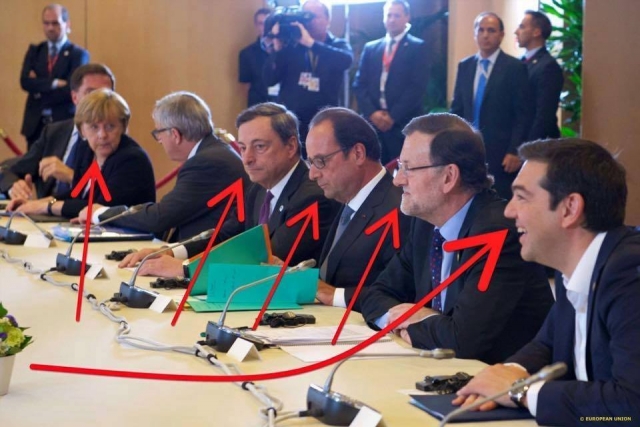Photo: Kathimerini, cartoon by Peter Brooks, The New York Times
All are openly talking about GREXIT already. The term that was thick with dust and lost in oblivion until five months ago today is about to become reality. Yesterday the Greek government became a laughing stock all over Europe and beyond, when, at its request, the euro zone finance ministers gathered in Brussels, and the heads of states after them, to hear the new Greek proposal for ending the crisis but it turned out that there was no such thing. Following the results of Sunday's referendum, when 61% of Greeks said NO to an agreement with creditors, the position of Prime Minister Alexis Tsipras at the negotiating table is extremely difficult.

The statement of German Chancellor Angela Merkel has made clear that despite the categorical victory of the negative vote, not only have the creditors not changed their requirements but they have also hardened their position. European Commission President Jean-Claude Juncker has made a step forward, announcing that Europe has an operational action plan in case of GREXIT.
The creditors, including Director of the International Monetary Fund Christine Lagarde and President of the European Central Bank Mario Draghi who also attended the meeting in Brussels, have requested Greece to tell them by Friday afternoon what it really wants in order for them to consider its proposal at an extraordinary meeting of the Eurogroup on Saturday and at another summit of the European Union heads of states on Sunday.

While the European officials were worried, the Greek prime minister was impressively smiling and serene. After the meeting, he said his government would continue the efforts to find a sustainable and socially just solution to the Greek problem. However, there are not many options before Alexis Tsipras, in fact, there are only two, namely to accept a difficult agreement that would bring many restrictions for ordinary Greeks but leave them in the euro zone or to lead the country to the catastrophe of the drachma.
Of course, the problem with many unknowns is whether the Greek parliament, and especially the MPs from the ruling coalition of SYRIZA and Independent Greeks, would support any agreement with creditors, despite the bank holiday that has already lasted nine days.